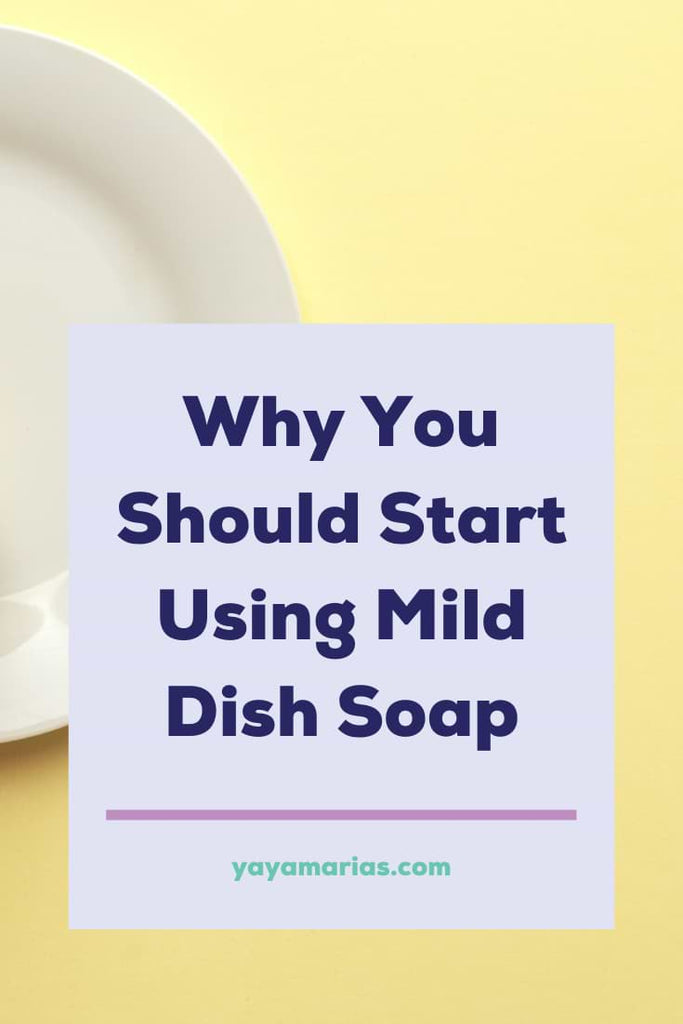Why You Should Start Using Mild Dish Soap
In this post you will learn about the benefits of mild dish soap.
Why it’s good for you.
Why it’s waaaaay healthier than conventional dish soap.
Plus, we’ll also give you a list of things that you are probably already doing that will have best results with a mild dish soap.
Let’s do this!

Why use mild dish soap?
When you do the dishes by hand, your skin comes into contact with the dish soap.
We know you knew that.
But here’s the point:
Conventional dish soaps include harsh chemicals: chief among them surfactants (foaming agents) like sodium lauryl sulfate (SLS).
Surfactants in your soap come with a number of dangers.
Sodium laureth sulfate and sodium lauryl sulfate, for example, cause short- and long-term water pollution after they go down the drain; can damage your DNA; harm reproductive, respiratory, endocrine, digestive, and nervous systems; and can cause cancer.
How?
After you do the dishes, the chemicals in your dish soap cling on to the outer layer of your skin.
This allows them to enter your skin more deeply (and from there, carry on into your bloodstream to spread out inside your entire body).
Watch this video:
And there’s more.
Surfactants also remove the helpful natural oils from your skin’s surface.
This is why your skin feels dehydrated after doing the dishes with conventional dish soap.
And it explains why it often leaves your skin dry, itching, and irritated (learn how to get soft hands naturally).
If you tend to get red, dry skin easily, then a mild dish soap (great for sensitive skin) is the solution.
But first...
What is mild dish soap?
A mild dish soap doesn’t include any of the harsh chemicals, such as benzisothiazolinone, cocamidopropyl betaine, dipropylene glycol, fragrance, colors, or SLS that the vast majority of dish soaps contain.
Period.
That’s how simple it is.
Mild dish soap only uses natural ingredients that are good for your skin.
The benefit?
No more dehydrated skin after doing the dishes.
No more skin irritations from toxins in your dish soap.
And no more need to waste money on a bunch of hand moisturizers to undo the damage caused by your dish soap.
The great thing about mild dish soap is that you can use it for lots more than just your dishes.
Things you should only wash with mild dish soap
Obviously, mild dish soap is the best dish soap for sensitive skin.
But it has plenty of other uses.
In fact, there are a number of tasks that you are probably already doing, that you should actually only be using mild dish soap for:
1. Use mild dish soap on hardwood flooring
Mild dish soap is great for cleaning hardwood floors for a couple of reasons.
Since mild dish soap has no harsh chemicals in its formula, and since the floor is the largest area to clean in your home, you’re not spreading toxins all over the place.
Another benefit is that it’s mild enough for the finish.
Here’s how to clean your hardwood floor with gentle dish soap:
Add ¼ cup of dish soap to 1 gallon of warm water.
Dip a clean mop in the solution and wring it out so it's barely damp.
Mop the floor, being careful to not let water stand on the floor.
For more shine, you can buff the freshly mopped floor with a clean, dry cloth or towel.
2. Use mild dish soap to remove stains
Mild dishwashing soap does a great job removing food stains.
And the great thing?
You don’t have to worry about the material getting damaged.
Simply dab some water on the affected area, then add a few drops of gentle dish soap and carefully rub ‘em in.
Wash out the soap after a few minutes. If necessary, repeat these steps until the stain is gone.
Remember, though, that standard home carpets (made from engineered plastic) and expensive rugs (made from natural fibers and delicate dyes) require different kinds of care.
Whereas mild dish soap works great on carpet, seek professional advice when cleaning a fine rug.
3. Use mild dish soap to clean plants
Wanna make the leaves of your houseplants shine?
Simply wash them with a mix of water and mild dish soap.
It’s the simplest way to remove any grime stuck to the leaves, allowing the plants to photosynthesize more easily.
And more importantly, it prevents pests from inhabiting your plants.
If you were to do this with conventional soap, you’d leave behind a chemical residue on your plants.
Since mild dishwashing soap is eco-friendly, there’s no such worry.
Simply prepare a mix of soap and lukewarm water, and soak a soft washcloth in the mixture. Gently wipe the leaves’ tops and undersides.
Use a dry washcloth to gently wipe off the liquid
Done.
4. Use mild dish soap for retainers
If you’ve been using tablets to clean your retainer, here’s some news for you:
Tablets are no more effective at removing bacteria than mild dish soap.
Want some proof?
Here’s a study.
Carefully rubbing your retainer with some gentle dish soap and then rinsing it keeps it just as clean and sweet-smelling as tablets do, without the chemical residue.
5. Use mild dish soap on pacifiers and baby bottles
If you have a sweet little one, you know the pacifier winds up on the floor a lot.
Reason to worry? Nope.
Simply wash it off with a bit of mild dish soap, and the binky is ready to go back in the mouth.
The same also works for baby bottles, baby bottle nipples, and toys.
Mild dish soap made from natural ingredients prevents the nasty stuff lingering in household dust –flame retardants, microplastics, and lead that your home’s structure, carpeting, and furniture cough up-- from getting into baby’s mouth.
No dirt, no chemical residue – just a happy baby.
6. Clean piercings with mild dish soap
There are a bunch of things that can gunk up your piercings:
Sweat, natural oils from your skin, dirt from the environment, cosmetics, and even cigarette smoke.
Some of them even remain after showering or soaking them in water.
Mild dish soap works great for removing any stubborn residue.
As a first step, wash your hands.
Then put a few drops of mild dishwashing soap on your fingertips and rub them together to create some lather.
Carefully rub your piercings and rinse them with water.
Clean piercings, no infections – and no chemicals.
Over to you
There are lots more tips for using natural, nontoxic, and mild dish soap that you can check out.
Want to learn more about a mild dish soap that is tough on grease and dirt but gentle on hands and health?
Sound good?
Then check out the most natural dish soap there is right here.
(When you make a purchase from links in this post we might receive a small commission at no additional cost to you.)


Back to News